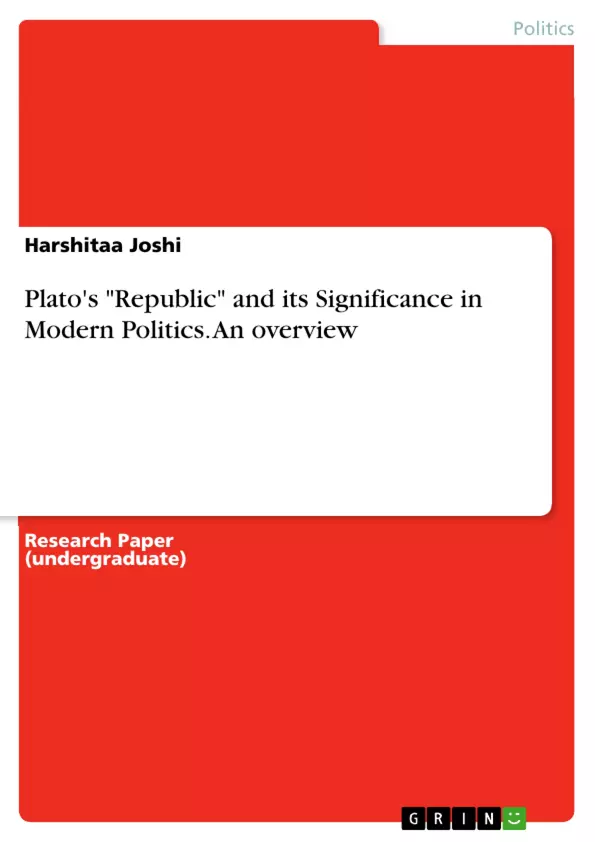This paper gives an analysis of Plato’s "Republic" as a law student. It is the best explanation of ideas, of thoughts and of political concepts related to justice, liberty, war, freedom and so on, that are needed to understand political environment better. The researcher has focused on reproduction and analysis of these ideas as well as in various research papers, articles and journals.
Due to paucity of time, in-depth study of every topic wasn’t possible. The researcher selected three aspects of great importance and relevance- Conception of State, Division of State and Justice. After analysis of these aspects in detail, the researcher has tried to compare Plato to the modern political beliefs. Law is intricately connected to Political Science, both shape each other. Not all ideas presented can be applied to present day society, however they can be used to analyze the development of society’s soul. The research question the researcher wishes to answer is- What significance does Plato’s Republic hold in the context of modern political understanding?
Table of Contents
- Introduction
- Chapter 1: Division of Society in Plato's Republic- Rulers, Auxiliaries and Producers
- Chapter 2: The Conventional View of Justice
- Chapter 3: Justice
- Chapter 4: Plato's Ideal State
- Chapter 5: Plato in Modern Politics
Objectives and Key Themes
This research delves into the significance of Plato's Republic in contemporary political understanding. The study examines Plato's theories on justice, the ideal state, and the division of society, comparing them to modern political beliefs.
- The division of society in Plato's Republic
- The concept of justice in Plato's Republic
- The ideal state as envisioned by Plato
- The relevance of Plato's ideas to modern politics
- The influence of Plato's Republic on contemporary political thought
Chapter Summaries
Introduction: This chapter provides an overview of Plato's Republic, highlighting its enduring relevance in modern political discourse. It discusses the historical context in which the work was written and the method of argument employed by Plato. The chapter also introduces the main characters in the dialogue, including Socrates, Thrasymachus, Glaucon, and Adeimantus, and their respective viewpoints.
Chapter 1: Division of Society in Plato's Republic- Rulers, Auxiliaries and Producers: This chapter examines Plato's classification of society into three classes: Rulers, Auxiliaries, and Producers. It explores the roles and responsibilities of each class, highlighting the importance of the Rulers in maintaining the stability and harmony of the state. The chapter also discusses Plato's Foundation Myth, which suggests that children should be sorted into different classes based on their innate abilities.
Keywords
Plato's Republic, Justice, Ideal State, Division of Society, Political Philosophy, Modern Politics, Ancient Greece, Socrates, Thrasymachus, Glaucon, Adeimantus, Rulers, Auxiliaries, Producers, Foundation Myth.
- Quote paper
- Harshitaa Joshi (Author), 2023, Plato's "Republic" and its Significance in Modern Politics. An overview, Munich, GRIN Verlag, https://www.hausarbeiten.de/document/1344174


